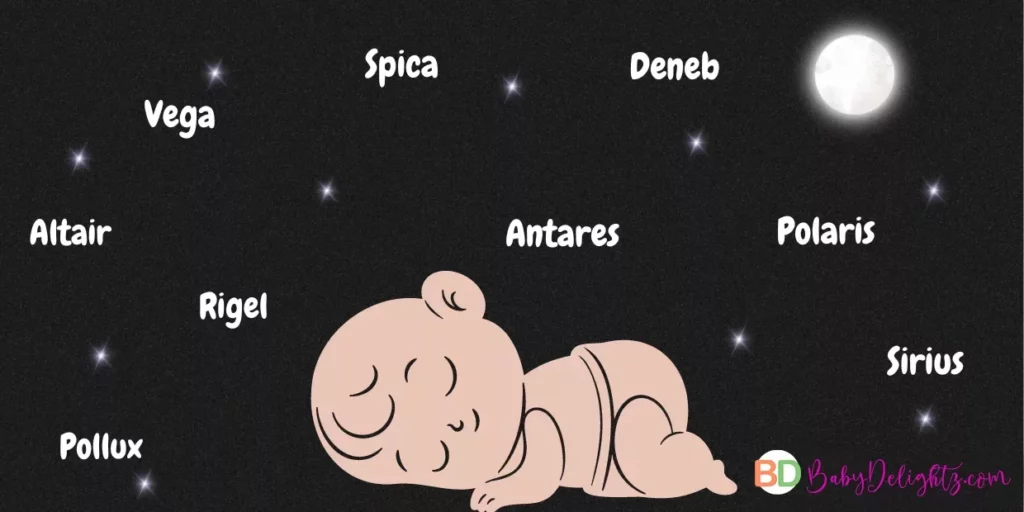Embark on a celestial journey to explore Beautiful Star Names. Delve into their origins, stories, and the magic they bring to the night sky. Click to discover the universe’s splendor!
Want your child to shine like a star? Why not take the first step by giving them a cosmic name that illuminates the environment where it’s uttered in. The celestial names offer a gateway to knowledge of history, cultures, celestial events, and ancient legends in the most exquisite manner. These beautiful star names will take you on a cosmic journey and make the process of naming your child profoundly intriguing.
Just as the stars shimmer timelessly in the night sky, they names remain timeless and unique. These names are not only beautiful to utter but also carry strong, deep, and beautiful meanings that will inspire your child’s personality to shine as bright as the Sun.
Join us in choosing a celestial identity for your child, ensuring they shine with the very first breath they take!
A Brief Glimpse at the Heavens
For centuries, humankind has looked to the skies for inspiration. Star names, many originating from ancient civilizations, encapsulate tales of gods, heroes, and celestial events. They are rooted in mythology, science, and culture, offering a rich tapestry of significance and symbolism.
Constellation Queens: Feminine Star Names
Stars have long held significance in human history, often inspiring names that exude ethereal beauty and celestial wonder. Many feminine star names originate from various cultures, each carrying its own tale of cosmic wonder, mythological significance, or astronomical discovery.
Feminine Star Names
- Astra (Greek) – Meaning “star.”
- Estelle (French) – Meaning “star.”
- Stella (Latin) – Meaning “star.”
- Danica (Slavic) – Meaning “morning star.”
- Aludra (Arabic) – Star in the Canis Major constellation.
- Tara (Sanskrit) – Meaning “star.”
- Roxana (Persian) – Meaning “dawn” or “little star.”
- Elara (Greek) – One of Jupiter’s moons.
- Sirius (Greek) – Brightest star in the sky.
- Lyra: Derived from the lyre-shaped constellation, this name is reminiscent of music and harmony.
- Vega: The brightest star in the Lyra constellation, symbolizing an eagle’s falling star.
- Carina: After the Carina constellation, it echoes the keel of a ship and resonates with the idea of guidance and navigation.
- Alya: Originating from the Theta Serpentis star in the Serpens constellation, Alya signifies ‘heavenly’ or ‘lofty’ in Arabic.
- Maia: A star in the Taurus constellation and one of the Pleiades sisters in Greek mythology.
- Electra: Another star from the Pleiades, representing the glowing amber gemstone.
- Talitha: From the Ursa Major constellation, this name is of Arabic origin, meaning ‘third.’
- Adhara: The second-brightest star in the Canis Major constellation, its name means ‘maidens’ in Arabic.
- Bellatrix: Located in the Orion constellation, its Latin origin stands for ‘female warrior’ or ‘warrioress.’
Celestial Kings: Masculine Star Names
Stars have long inspired humanity, leading to the creation of captivating names derived from celestial bodies. These masculine star names, rooted in various cultures, offer a blend of myth, history, and wonder.
Masculine Star Names:
- Altair – Arabic: “Flying eagle”; The brightest star in the Aquila constellation.
- Sirius – Greek: “Glowing”; The brightest star in our night sky.
- Rigel – Arabic: “Foot”; Blue supergiant star in Orion.
- Castor – Greek: “To excel or shine”; One of the Gemini twins.
- Pollux – Greek: “Much wine”; The other Gemini twin.
- Vega – Arabic: “Swooping eagle”; Bright star in Lyra.
- Antares – Greek: “Rival of Ares”; Heart of the Scorpio constellation.
- Orion – Greek: Named after the hunter in Greek mythology.
- Leo – Latin: “Lion”; One of the zodiac constellations.
- Perseus – Greek: Hero who saved Andromeda; a constellation.
- Leo: Derived from the zodiac constellation of Leo, symbolizing strength, power, and royalty.
- Altair: The brightest star in the Aquila constellation, its name means ‘the flying eagle’ in Arabic.
- Rigel: A blue supergiant star in the Orion constellation, representing the hunter’s left foot.
- Sirius: Often referred to as the Dog Star because it’s part of the Canis Major constellation, it’s the brightest star in our night sky.
- Perseus: A hero in Greek mythology and a constellation name, evoking tales of bravery and adventure.
- Castor: One half of the Gemini twins, Castor is a symbol of togetherness and brotherhood.
- Pollux: The other half of the Gemini twins, offering the same sense of unity as Castor.
- Aries: Stemming from the zodiac constellation, this name exudes leadership, energy, and enthusiasm.
Cultural Constellations: Diverse Star Names
Diverse cultures have gazed at the same sky but christened stars differently. These names, enriched with heritage and meaning, provide a cosmic tapestry that narrates our shared human experience.
Diverse Star Names:
- Vega (Arabic) – “Swooping eagle”
- Sirius (Greek) – “Glowing” or “Scorching”
- Altair (Arabic) – “Flying one” or “Bird”
- Betelgeuse (Arabic) – “Hand of the giant Orion”
- Deneb (Arabic) – “Tail”
- Polaris (Latin) – “Near the pole”
- Rigel (Arabic) – “Foot”
- Spica (Latin) – “Ear of grain”
- Antares (Ancient Greek) – “Rival of Mars”
- Aldebaran (Arabic) – “The Follower”
- Capella (Latin) – “Little she-goat”
- Chandra: In Hindu culture, Chandra is the moon god, exuding calm and serenity.
- Danica: Of Slavic origin, this name translates to ‘morning star’ and is tied to the planet Venus.
- Estelle/Estella: With Latin roots, both names translate to ‘star,’ offering a timeless appeal.
- Hoshi: A Japanese name, which means ‘star,’ simple yet profoundly meaningful.
- Tara: In Sanskrit, Tara signifies ‘star.’ It’s also associated with a revered Tibetan Buddhist deity.
- Nayeli: In the Zapotec culture, Nayeli translates to ‘I love you.’ It also has associations with ‘little star.’
- Sidra: Of Arabic origin, it means ‘like a star’ and resonates with charm and allure.
- Sitarah: Also from Arabic, this name means ‘star.’
- Yıldız: In Turkish, Yıldız translates directly to ‘star.’

Age-Old Stars: Historic and Mythological Significance
“Age-Old Stars” refer to ancient celestial entities that have illuminated our universe for eons. Their names, often derived from various cultures, encapsulate stories, myths, and histories that echo the mysteries of the cosmos.
Names with Meanings and Origin:
- Aldebaran (Arabic) – “The Follower”; a bright star in the Taurus constellation.
- Sirius (Greek) – “Glowing” or “Scorching”; the brightest star in the night sky.
- Vega (Arabic) – “Falling” or “Swooping”; a star in the Lyra constellation.
- Rigel (Arabic) – “Foot”; a bright star in the Orion constellation.
- Altair (Arabic) – “The Flying Eagle”; in the Aquila constellation.
- Betelgeuse (Arabic) – “Armpit of the Central One”; a giant star in Orion.
- Antares (Greek) – “Rival to Mars”; heart of the Scorpius constellation.
- Deneb (Arabic) – “Tail”; the brightest star in Cygnus.
- Spica (Latin) – “Ear of Grain”; a star in the Virgo constellation.
- Procyon (Greek) – “Before the Dog”; brightest star in Canis Minor.
- Polaris (Latin) – “Pole Star”; the North Star in the Ursa Minor constellation.
- Capella (Latin) – “Little She-Goat”; a star system in the Auriga constellation.
- Asteria: In Greek mythology, Asteria was the goddess of the stars and nighttime divinations.
- Andromeda: A princess in Greek myths, she has a constellation named in her honor.
- Cassiopeia: Another figure from Greek myths and a constellation, she was a vain queen known for her unmatched beauty.
- Draco: Stemming from the dragon-shaped constellation, this name is filled with might and mysticism.
- Helene: Named after one of Saturn’s moons, this name takes inspiration from Helen of Troy.
- Julian: Derived from Julius Caesar, who had a comet named in his memory.
- Luna: Representing the moon in Roman mythology, Luna stands for grace and beauty.
- Phoenix: A constellation in the southern sky, the name also reflects the mythical bird that rises from its ashes.
- Ulysses: Commemorating the great explorer, this name is associated with a comet and speaks of wanderlust and adventure.
Star Names List
Stars have fascinated humans for millennia. Across cultures, many stars are named, often drawing inspiration from mythology, legends, and nature. These names not only hold scientific significance but also echo stories from our shared human history.
Star Names List:
- Sirius (Greek) – “Glowing” or “Scorching”
- Vega (Arabic) – “Swooping Eagle”
- Rigel (Arabic) – “Foot”
- Altair (Arabic) – “The Flying One”
- Deneb (Arabic) – “Tail”
- Betelgeuse (Arabic) – “Hand of Orion”
- Aldebaran (Arabic) – “The Follower”
- Spica (Latin) – “Ear of Grain”
- Antares (Ancient Greek) – “Rival to Ares” or “Anti-Mars”
- Pollux (Greek) – “Very Sweet”
- Castor (Greek) – “Beaver”
- Fomalhaut (Arabic) – “Mouth of the Fish”
- Regulus (Latin) – “Little King”
- Bellatrix (Latin) – “Warrior Woman”
- Procyon (Ancient Greek) – “Before the Dog”
- Achernar (Arabic) – “End of the River”
- Mintaka (Arabic) – “Belt”
- Gacrux (Modern) – Abbreviation of the Latin phrase for “Cross of the South”
- Alphard (Arabic) – “The Solitary One”
- Alnilam (Arabic) – “String of Pearls”
Star Names for Babies
Celestial names have always captivated parents seeking an ethereal touch for their offspring. Drawing inspiration from the cosmos, star names illuminate the vast expanse of human imagination, grounding dreams to Earth while connecting us to the universe.
Star Names for Babies:
- Astra (Latin) – “Star.”
- Astria (Greek) – “Star-filled.”
- Celeste (Latin) – “Heavenly.”
- Danica (Slavic) – “Morning star.”
- Estelle (French) – “Star.”
- Estrella (Spanish) – “Star.”
- Hoshi (Japanese) – “Star.”
- Lyra (Greek) – Named after a constellation.
- Nova (Latin) – “New star.”
- Orion (Greek) – A prominent constellation.
- Rigel (Arabic) – Blue supergiant star in Orion.
- Sirius (Greek) – “Glowing” or “scorcher.”
- Stella (Latin) – “Star.”
- Seren (Welsh) – “Star.”
- Tara (Sanskrit) – “Star.”
- Vega (Arabic) – One of the brightest stars in the night sky.
- Altair (Arabic) – “Flying eagle” or “bird.”
- Nashira (Arabic) – “Bearer of good news.”
- Sidra (Arabic) – “Like a star.”
- Astrophel (Greek) – “Star-lover.”
Star Name Ideas
Stars have forever guided and inspired humanity. Naming them carries a legacy, intertwining our existence with the vast universe. Here are 20 stellar names with their meanings and origins:
Star Name Ideas list
- Lyra (Greek) – Lyre, a constellation in the northern sky.
- Sirius (Greek) – Glowing, brightest star in our night sky.
- Nova (Latin) – New, for a star showing sudden brightness.
- Vega (Arabic) – Falling, brightest star in the Lyra constellation.
- Stella (Latin) – Star.
- Astra (Greek) – Star.
- Rigel (Arabic) – Foot, a blue supergiant star in Orion.
- Orion (Greek) – Hunter, a prominent constellation.
- Altair (Arabic) – Flying eagle, brightest star in Aquila.
- Luna (Latin) – Moon, not a star, but a celestial body.
- Astria (Greek) – Starry one.
- Nashira (Arabic) – The lucky one, a star in Capricornus.
- Danica (Slavic) – Morning star.
- Bellatrix (Latin) – Female warrior, a star in Orion.
- Cassiopeia (Greek) – A queen in mythology, constellation in the northern sky.
- Electra (Greek) – Shining, one of the Pleiades stars.
- Mira (Latin) – Wonderful, a variable star in Cetus.
- Talitha (Arabic) – Third, a star in Ursa Major.
- Polaris (Latin) – Pole star, the North Star.
- Deneb (Arabic) – Tail, a star in the Cygnus constellation.
Beautiful Star Names
Stars have always captivated humanity, not just for their celestial beauty but also for the allure of their names. Many star names have ancient origins, reflecting tales and myths that span civilizations. Below are 20 beautiful star names, each brimming with a rich history and ethereal charm.
Names with Meanings and Origin
- Astra: Latin origin meaning “star.”
- Sirius: Greek origin meaning “glowing” or “scorcher.”
- Lyra: Named after the lyre of Orpheus, a Greek musical instrument.
- Stella: Latin origin meaning “star.”
- Vega: Arabic origin meaning “swooping eagle.”
- Rigel: Arabic origin meaning “foot.”
- Altair: Arabic origin meaning “the flying one.”
- Deneb: Arabic origin meaning “tail.”
- Antares: Greek origin meaning “rival of Mars.”
- Bellatrix: Latin origin meaning “warrior woman.”
- Capella: Latin origin meaning “little she-goat.”
- Aldebaran: Arabic origin meaning “the follower.”
- Fomalhaut: Arabic origin meaning “mouth of the fish.”
- Spica: Latin origin meaning “ear of grain.”
- Polaris: Latin origin named for its proximity to the North Pole.
- Betelgeuse: Arabic origin meaning “armpit of the giant.”
- Electra: Greek origin, named after the Pleiade Electra.
- Maia: Greek origin, eldest of the Pleiades sisters.
- Mira: Latin origin meaning “wonderful.”
- Nashira: Arabic origin meaning “bearer of good news.”
Names of Stars and Moons
Stars and moons have guided civilizations for millennia. Their names, often rooted in mythology and ancient cultures, bear tales of gods, heroes, and cosmic events. These celestial names not only illuminate our night skies but connect us to our shared human history.
Names of Stars and Moons
- Aldebaran (Arabic): “The Follower” – A bright red star in the Taurus constellation.
- Betelgeuse (Arabic): “The Giant’s Shoulder” – A supergiant star in Orion.
- Sirius (Greek): “Glowing” – The brightest star in our night sky.
- Rigel (Arabic): “Foot” – A blue supergiant star in Orion.
- Antares (Greek): “Rival to Mars” – The heart of the Scorpio constellation.
- Vega (Arabic): “Swooping Eagle” – The brightest star in the Lyra constellation.
- Altair (Arabic): “The Flying One” – The brightest star in Aquila.
- Deneb (Arabic): “Tail” – A bright star in Cygnus.
- Polaris (Latin): “Pole Star” – The North Star.
- Castor (Greek): “Beaver” – One of two stars in the Gemini constellation.
- Proxima Centauri (Latin): “Nearest [star] of Centaurus” – The closest star to our sun.
- Mira (Latin): “Wonderful” – A variable star in Cetus.
- Titan (Greek): Named after the Titans, the elder gods – Saturn’s largest moon.
- Io (Greek): A priestess of Hera – One of Jupiter’s moons.
- Europa (Greek): A Phoenician princess whom Zeus loved – Another of Jupiter’s moons.
- Callisto (Greek): “Most Beautiful” – Yet another moon of Jupiter.
- Ganymede (Greek): A young Trojan prince – The largest moon of Jupiter.
- Triton (Greek): A Greek sea god – Neptune’s largest moon.
- Phobos (Greek): “Fear” – One of Mars’ two moons.
- Deimos (Greek): “Dread” – Mars’ other moon.
What is the most beautiful star name?
For a star, there is hardly one name that is not beautiful. All stars have names with exquisite meaning and pleasant sounds but some names radiate more brightly than others. Following are the names that are considered the most beautiful star names:
most beautiful star name
- Astra – Greek origin, meaning “star.”
- Stella – Latin origin, meaning “star.”
- Danica – Slavic origin, meaning “morning star.”
- Estelle – French origin, meaning “star.”
- Hoshi – Japanese origin, meaning “star.”
- Tara – Sanskrit origin, meaning “star.”
- Sidra – Arabic origin, meaning “like a star.”
- Lyra – Named after the lyre-shaped constellation.
- Sirius – From the brightest star in our night sky.
- Vega – The fifth brightest star, of Lyra constellation.
- Rigel – A blue supergiant star in the Orion constellation.
- Altair – Part of the Aquila constellation, means “flying eagle” in Arabic.
- Deneb – Part of the Cygnus constellation, Arabic for “tail.”
- Castor – From the Gemini constellation, meaning “beaver” in Greek.
- Pollux – Twin of Castor in Gemini.
- Bellatrix – A star in Orion, Latin for “female warrior.”
- Aldebaran – Arabic for “follower,” a star in the Taurus constellation.
- Mira – Meaning “wonderful,” a binary star system in the Cetus constellation.
- Nashira – Arabic for “bringer of good news,” a star in Capricorn.
- Capella – Latin for “small female goat,” the brightest star in the Auriga constellation.
Conclusion: A Universe of Choices
Choosing a name for your child is a personal journey, filled with hope, dreams, and aspirations. By selecting a star name, you’re grounding these aspirations in the vastness of the cosmos, while also endowing your child with the timeless beauty that starlit nights have provided for millennia. As you embark on this exciting journey, may the stars guide your path, illuminating the perfect name for your radiant new arrival.
Frequently Asked Questions (FAQs)
What Should I name my start?
Choosing a name for your star is a personal decision. However, some considerations are universally taken into account when selecting one. They are:
- The name should hold valuable meaning to you.
- It should be unique because you would not like a name that’s too common.
- The name should be easy to pronounce and has a nice ring to it.
- It should be as timeless as a star
What cultures predominantly use star names?
- Many cultures, from Arabic to Polynesian, have star-related names. They often arise from ancient astronomical observations and myths tied to constellations.
Is it a trend to name children after cosmic entities?
- Over the past few decades, cosmic and nature-related names have seen a resurgence. This could be due to a greater emphasis on nature, science, and the universe, or simply the beauty and wonder they invoke.
Are there meanings behind these names beyond their cosmic connection?
- Yes, many star names carry additional meanings or are deeply rooted in myths and legends. For instance, Sirius, while being the name of the brightest star, is also associated with the ancient Egyptians who used its rising to predict the annual flooding of the Nile.
Can star names be combined to create unique names?
- Combining names is a creative approach! For example, “Lyra Vega” or “Sirius Altair” can be unique blends, just ensure the flow sounds harmonious.
Do any of these names have specific cultural or religious significance?
- Some names might. Arundhati, for instance, is revered in Hindu culture and relates to marital bliss and fidelity. Always research and respect the cultural implications and significance of a name.








